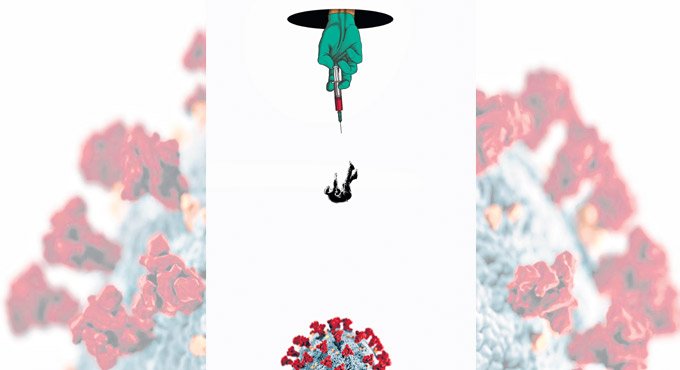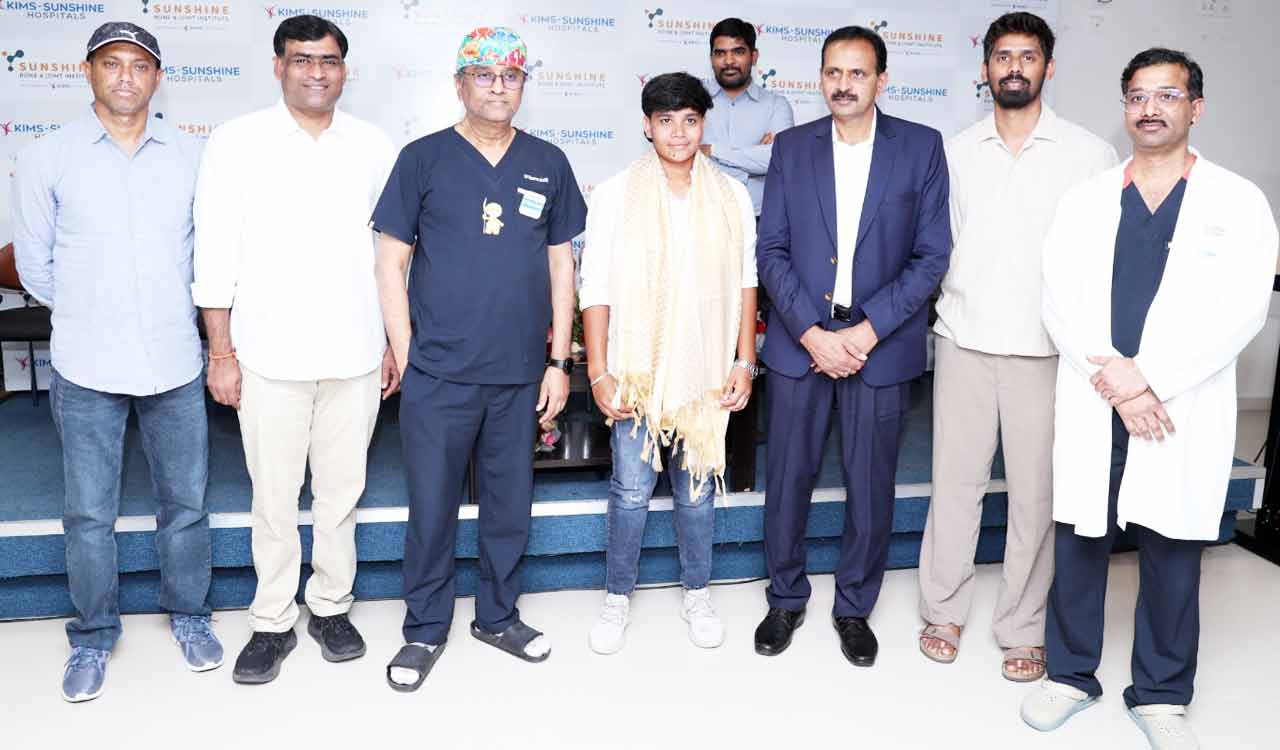Shots of Hope
It is more than a sigh of relief as the vaccine that the world was desperately waiting for has finally arrived and more options are on the way

The world’s first Covid-19 vaccine for general use got the go-ahead in Britain on December 2. The green light to the Pfizer/BioNTech drug marked the first big success for researchers who have been toiling hard to find an antidote to a disease that has had the world in a spin.
Exactly a week thereafter on December 9, Canada cleared the way for using the Pfizer/BioNTech Covid-19 vaccine in the country. And on Friday, the United States too gave the go-ahead for the Pfizer/BioNTech vaccine, with President Donald Trump hailing it as a “medical miracle” and saying that the first immunisations would take place “in less than 24 hours.” Bahrain and Saudi Arabia also have given the go-ahead for the Pfizer/BioNTech vaccine and Israel is targeting a rollout on December 27.
However, many lingering questions about the vaccines remain. Key issues include whether more side-effects will emerge with longer follow-up, how long the vaccine will remain effective, whether it will limit transmission and how it will work in children, pregnant women. With other vaccines likely to follow soon and with experts stressing the need for widespread vaccination to reach herd immunity – where enough people are immune to stop the disease from spreading freely – should a Covid-19 vaccine be mandatory?
Protective Seatbelts
A Covid-19 vaccination should be mandatory – at least for certain groups. This means there would be penalties for failure to vaccinate, such as fines or limitations on freedom of movement. The less burdensome it is for an individual to do something that prevents harm to others, and the greater the harm prevented, the stronger the ethical reason for mandating it.
Being vaccinated dramatically reduces the risk of seriously harming or killing others. Vaccines that prevent people from getting sick are also likely to be effective at stopping the virus from spreading, though possibly to a lower degree. Such benefits would come at a very minimal cost to individuals.
Also, mandatory vaccination ensures that the risks and burdens of reaching herd immunity are distributed evenly across the population. Because herd immunity benefits society collectively, it’s only fair that the responsibility of reaching it is shared evenly among society’s individual members.
Of course, we might achieve herd immunity through less restrictive alternatives than making vaccination mandatory – such as information campaigns to encourage people to be vaccinated. But even if we reach herd immunity, the higher the uptake of vaccines, the lower the risk of falling below the herd immunity threshold at a later time. We should do everything we can to prevent that emergency from happening – especially when the cost of doing so is low.
Fostering trust and driving uptake by making people more informed is a nice narrative, but it’s risky. Merely giving people information on vaccines does not always result in increased willingness to vaccinate and might actually lower confidence in vaccines. On the other hand, we’ve seen mandatory vaccination policies in Italy recently successfully boost vaccine uptake for other diseases.
Mandatory seatbelt policies have proven very successful in reducing deaths from car accidents, and are now widely endorsed despite the (very small) risks that seatbelts entail. We should see vaccines as seatbelts against Covid-19. In fact, as very special seatbelts, which protect ourselves and protect others.
By Alberto Giubilini
(The author is Senior Research Fellow, Oxford Uehiro Centre for Practical Ethics, University of Oxford, www.conversation.com)
Little Justification
Mandatory vaccination does not automatically increase vaccine uptake. An EU-funded project on epidemics and pandemics, which took place several years before Covid-19, found no evidence to support this notion. Looking at Baltic and Scandinavian countries, the project’s report noted that countries “where a vaccination is mandatory do not usually reach better coverage than neighbour or similar countries where there is no legal obligation”.
According to the Nuffield Council of Bioethics, mandatory vaccination may be justified for highly contagious and serious diseases. But although contagious, Public Health England does not classify Covid-19 as a high-consequence infectious disease due to its relatively low case fatality rate.
Covid-19 severity is strongly linked with age, dividing individual perceptions of vulnerability within populations. The death rate is estimated at 7.8% in people aged over 80, but at just 0.0016% in children aged nine and under. In a liberal democracy, forcing the vaccination of millions of young and healthy citizens who perceive themselves to be at an acceptably low risk from Covid-19 will be ethically disputed and is politically risky.
Public apprehensions for a novel vaccine produced at breakneck speed are wholly legitimate. A UK survey of 70,000 people found 49% were “very likely” to get a vaccine once available. US surveys are similar. This is not because the majority are anti-vaxxers.
Despite promising headlines, the trials and pharmaceutical processes surrounding them have not yet been scrutinised. With the first trials only beginning in April, there is limited data on long-term safety and efficacy. We don’t know how long immunity lasts for. None of the trials were designed to tell us if the vaccine prevents serious disease or virus transmission.
To disregard these ubiquitous concerns would be counterproductive. As a tool for combating anti-vaxxers – estimated at around 58 million globally and making up a small minority of those not getting vaccinated – mandatory vaccines are also problematic. The forces driving scientific and political populism are the same. Anti-vaxxers do not trust experts, industry and especially not the government. A government mandate will not just be met with unshakeable defiance, but will also be weaponised to recruit others to the anti-vaxxer cause.
In the early 1990s, polio was endemic in India, with between 500 and 1,000 children getting paralysed daily. By 2011, the virus was eliminated. This was not achieved through legislation. It was down to a consolidated effort to involve communities, target high-need groups, understand concerns, inform, educate, remove barriers, invest in local delivery systems and link with political and religious leaders.
Mandatory vaccination is rarely justified. The successful roll-out of novel Covid-19 vaccines will require time, communication and trust. We have come too far, too fast, to lose our nerve now.
By Vageesh Jain
(The author is NIHR Academic Clinical Fellow in Public Health Medicine, UCL, www.conversation.com)
Vaccine Curve
- AstraZeneca says it will clinically trial a vaccine with a mix of its own shot developed with Oxford University and Russia’s Sputnik V
- France’s Sanofi and Britain’s GSK say their protein-based vaccines will not be ready until the end of 2021, after interim results showed a low immune response in older adults
- Development of a promising Australian shot in phase-one trials is abandoned after it produced a false positive HIV test result in participants, sparking fears it could undermine public confidence.
- India has as many as seven vaccines in the pipeline with the first rollout happening anytime early next year. Adar Poonawala, CEO, Serum Institute of India, expects vaccination drive to start in India by January
- The novel coronavirus has killed at least 15,82,721 people since the outbreak emerged in China last December, as on Dec 11. The US is the worst-affected with 2,92,190 deaths, followed by Brazil with 1,79,765, India with 1,42,186 and Mexico with 1,12,326
Vaccinating the world
 The Big Numbers
The Big Numbers
- Estimated doses needed: 9 billion (Calculation based on assumed effectiveness of vaccines, including the need for booster shots)
- COVAX* coverage goal: 20% of member countries. COVAX is a global initiative co-led by the WHO and other multinational agencies aiming to pool the resources of rich countries to invest in logistics for an equitable distribution of vaccine doses. 184 governments are now involved.
- Doses ordered by COVAX so far – 250 million
- Vaccine doses to be distributed by end of 2021 – 2 billion
- Purchase orders by high and middle-income countries – 3.8 billion
Production plans
- Pfizer/BioNTech plan in 2021: 3 billion
- Moderna: 1 billion
- AstraZeneca and Oxford: 1 billion
- IATA estimates that delivering single dose to everyone on the planet would require 8,000 Boeing 747 cargo planes
Mammoth Tasks
Storage
- German firm Muller + Muller is making 600 million vials of shatter and temperature resistant chemically inert borosilicate glass vials
- Fellow German company Shott is preparing enough vials to store 2 billion doses
- Pfizer has designed insulated suitcase-sized containers that can keep 4,875 doses at below -70 oC.
- It needs to be refilled with 23kg of dry ice every day
- UPS is building 600 freezer farms at air hubs in the US and Europe, each capable of holding 48,000 vaccine doses
- UNICEF is preparing to distribute 1 billion syringes during 2021 and the United States is preparing for 850 million
- UNICEF is buying 5 billion safety boxes for used syringes
Source: New Scientist/Gavi.org/Duke health Innovation Center
Now you can get handpicked stories from Telangana Today on Telegram everyday. Click the link to subscribe.
Click to follow Telangana Today Facebook page and Twitter .
Related News
-
ABVP protests at TG BIE over delay in issuing hall tickets
4 mins ago -
BRS workers booked under SC/ST Act after stand-off with Mynampally Rohit
12 mins ago -
Toddy tapper electrocuted in Sangareddy
17 mins ago -
Invincible US Infrastructure Eyes Rs 100-Crore Fundraise; Bets Big on Solar-Powered Data Centres
26 mins ago -
SCB approves garbage transport tender and official records digitization
27 mins ago -
Inclusive Development: A Study of Community-centric Growth in Prabhakaran Mining Projects
28 mins ago -
Moon sighted, Ramzan to start from Thursday in Telangana
37 mins ago -
BRS women leaders approach SEC, Women’s Commission over assault in Kyathanapally
42 mins ago




